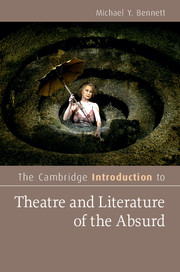Book contents
- Frontmatter
- Dedication
- Contents
- Acknowledgments
- Chapter 1 Introduction: Overview of the absurd
- Chapter 2 Setting the stage
- Chapter 3 The emergence of a “movement”: The historical and intellectual contexts
- Chapter 4 Samuel Beckett
- Chapter 5 Beckett's notable contemporaries
- Chapter 6 The European and American wave of absurdism
- Chapter 7 Post-absurdism?
- Chapter 8 Absurd criticism
- Notes
- Further reading
- Index
- Cambridge Introductions to …
Chapter 6 - The European and American wave of absurdism
Published online by Cambridge University Press: 05 November 2015
- Frontmatter
- Dedication
- Contents
- Acknowledgments
- Chapter 1 Introduction: Overview of the absurd
- Chapter 2 Setting the stage
- Chapter 3 The emergence of a “movement”: The historical and intellectual contexts
- Chapter 4 Samuel Beckett
- Chapter 5 Beckett's notable contemporaries
- Chapter 6 The European and American wave of absurdism
- Chapter 7 Post-absurdism?
- Chapter 8 Absurd criticism
- Notes
- Further reading
- Index
- Cambridge Introductions to …
Summary
It is probably most productive to start this chapter in much the same way as the last chapter: while Samuel Beckett may have been the most influential and studied writer of the group, Beckett was by no means the lone voice of the absurd. In general, the writers associated with the absurd in this chapter follow on the heels of Beckett (Chapter 4) and Beckett's notable contemporaries (Chapter 5). The writers in this chapter are generally writing at a slightly later date, usually in the mid-1960s, and come from a much larger geographic area (i.e., the “Western” world that sits on both sides of the Atlantic, instead of just the two West European nations that sit on either side of the English Channel – the United Kingdom and France.) Besides, for the sake of brevity and space limitation, this section and the discussion of each of the writers is shorter for the primary reason that the majority of these writers are known for only a select few of their works, especially those that most influenced/were influenced by absurd literature. Plus, while all these writers were major writers in their own time and place, none of them has attained quite the international stature or the overwhelming critical acclaim of Beckett, Albee, Genet, Ionesco, and Pinter.
Arthur Adamov
Arthur Adamov, a son of wealthy Armenian parents, was born in 1908 in Russia. Given that he was brought up with his first language as French, he moved to Paris in 1924. There he became a part of the Surrealist Movement and start to write plays after WWII. Adamov died in Paris in 1970 after an overdose of barbiturates. While Adamov also wrote fiction and worked as well as a translator, he is best known as a playwright, most noted for his plays Ping Pong and Professor Taranne (and the uproar caused by his politically charged play, Paolo Paoli). Martin Esslin characterized Adamov as one of the four principal absurdists (along with Beckett, Ionesco, and Genet). Despite this categorization, Adamov is discussed in much less detail in this chapter because he and his work simply neither gained the critical acclaim, notoriety, nor influence that Beckett, Albee, Pinter, Genet, and Ionesco's work generated.
- Type
- Chapter
- Information
- Publisher: Cambridge University PressPrint publication year: 2015

